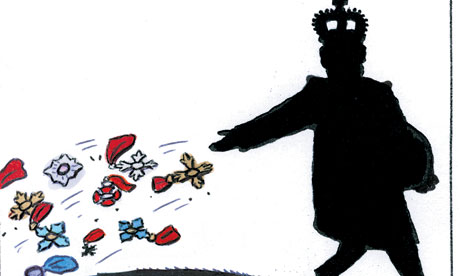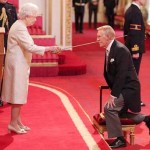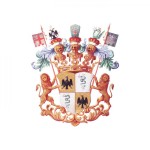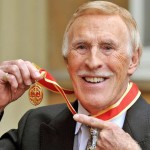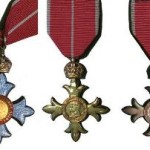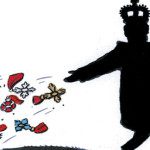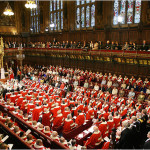Every country has its own favours upon its most distinguished sons and daughters, though none that I know of do it quite like the United Kingdom, whereby a plethora of antiquated and obsolete titles and quaint acronyms can be bestowed on individuals (and indirectly on their spouses in some cases) for often very obscure and inappropriate reasons.
There is so much about the British honours system I loathe, but perhaps most of all it is the references to the “British Empire“, which most readers but apparently not the establishment or a number of daily newspapers will have long since realised ended long ago. Oh, and the levels of chivalry with archaic titles, knighthoods with ceremonial sword by the monarch, the meaningless and pointless medieval titles conferred and so on. And of course the conferring of implied social privilege accorded to people sometimes without any proven merit, “buggin’s turn” and suchlike. But for these purposes I will ignore the anachronistic and ceremonial aspects and focus instead on the principles of and methods applied in awarding honours, before turning my hand to envisioning an alternative.
For starters though, why does any country need an honours system at all? After all, the majority of recipients are merely doing the jobs for which they are duly paid, often very large sums too. I’ll assume for these purposes we do need some means of recognising our finest citizens, but I’ll take issue with how they should be defined.
It used to be said that those in public service are given awards and honours as partial compensation for the sacrifice of accepting lower salaries than their equivalents in the private sector though that is no longer true, and even if it were (a) such awards go primarily to top brass rather than those throughout public service who are no less dedicated in their service, and (b) more than plenty go to people in the private sector too.
If length of service alone warranted knighthoods, there would be many such knights up and down the nation, not merely among the ranks of failed politicians, chief execs, civil servants and actors. Not indeed for services to the community, since ordinary folks like you and I could only hope to earn the lowest of lowly awards, the MBE, for a lifetime of sacrifice and dedication.
We evidently go through the masquerade of awarding state-sponsored trinkets because there is a level of expectation and desire for status to be acquired through an honour, something more meaningful than the vulgarity of greater wealth (this being the UK rather than the USA), a form of social one-upmanship that conveys an unspoken superiority over mere plebs, those who have not been deemed worthy. Small wonder then that at various times there have been both allegations and proven links between cash paid to political parties and the award of honours as part of the “services rendered”. If such corruption were proven it would of course be totally illegal, so parties have various techniques to ring-fence funding and favours to give the appearance of minimal cause-and-effect connection between A and B. In practice you suspect a blind eye is turned to many such transactions, and that cynicism is fully justified.
Not true of all awards, of course. In the civil service and armed forces there are reams of honours to which there is a massive expectation among recipients that these will be given as a right, not as a mark of exceptional achievement or service above and beyond the call if duty. That, as Sir Humphrey famously put it, would be regarded as the thin end of the wedge, though I wonder how many generations of incompetence have been rewarded with yet more honours bestowed and an affluent retirement. Many, you suspect. In the case of bungling politicians, being “kicked upstairs” out of harm’s way is the normal way, a process not available to we mere mortals and the greatest corruption of “honours” since it guarantees an income for life and influence in the appointed and therefore undemocratic upper house.
Granted there are some who have been responsible for genuinely valuable work behind the scenes, but then only those at the pinnacle are likely to be bestowed. However, the greatest number of honours are the ones open to the general public, but in practice mostly to comparatively few, and even then by a complicated system of nominations and “soundings” to determine if the person is fit and proper.
By that justification you might suppose that a good many such awards have gone to people who, with or without the benefit of hindsight, have proven disreputable. Granted that some people jailed for criminal offences have been stripped of their knighthoods, among them jockey Lester Piggott, but the same principle does not apply to those who have been ennobled – like Lords Black, Archer and others. As it happens, that particular law may be changed so that future criminal wrongdoers will be banned from the House of Lords for a period – but still not lose their titles, thanks to a legacy of absurd constitutional legislation. Small wonder some, myself included, would claim the whole system has been brought into disrepute.
Thankfully there are those who see beyond the absurdity and act with scruples rather than being on the make, among them Tony Benn, who as the young honourable Anthony Wedgewood-Benn fought to have the law changed to disavow the hereditary peerage conferred upon his father, in order to seek election as a “commoner” to the House of Commons. But absurdity is never far away from this system: the law change enacted merely enables the peerage to skip a generation so Benn’s first born son inherits the title, rather than it being abolished for good.
Of the lesser honours many are refused by those whose principles or other motives got in the way. Of recent instances, Stephen Hawking, Danny Boyle, David Bowie, Nigella Lawson (in spite of the revelations in her recent court case) and Simon Russell Beale head an illustrious list that includes many great names – even if some have accepted honours on other occasions. As George Bernard Shaw replied when turning down the Order of Merit, merit is something that can only be applied posthumously – a context you could readily apply to many such awards.
The fact is that we don’t need the vast majority of these awards, whatever warm, glowing feeling of superiority and recognition by the establishment they might convey. The one change made by Sir John Major as PM (he didn’t refuse his knighthood) was, rather than to change what was already there, introduce a system whereby nominations could be made for ordinary people, the likes of you and me, to be awarded honours – though as mentioned, just MBEs rather than class-ridden higher titles. Perhaps the whole system should be tipped on its head and focus not on the wealthy, powerful and renowned but on people who are never recognised, never honoured, never given pay rises; people who volunteer for community work year in, year out without moaning, but then watch MPs take the plaudits and honours for doing comparatively little.
In my ideal world there should be at most two or three awards, all of which are democratically awarded not by kickbacks but popular choice and on the basis of selfless service to community and country without any expectation or return. Where recipients have devoted themselves to years of giving without financial benefit, maybe they could be awarded an enhanced pension, but please – no prefixes or suffixes, no snootiness or garden parties to hobnob with social superiors. This should be an award relevant to the people to whom the service was given, not those cloistered in Whitehall, Westminster or Buckingham Palace. As for politicians and civil servants, they should prove they are delivering distinguished service above and beyond the call of duty. I’d much sooner reward a ward sister with 30 years helping to save lives than a Permanent Secretary or retired politician with a golden-plated pension.
Some would argue, with some justification, that all the snobbish anarchronisms and related reasons for despising honours are what people truly love about it. They want to see awards going to their favourite stars and to he associated with the flummery of class-ridden monarchic superiority, in preference to something modern and utilitarian. In many ways that is a sad condemnation of our country, though sycophantic patriots in our midst may see it as what puts the Great in Great Britain (an arrogant title to adopt for one’s country if ever there were one – what would we think of the USA if it called itself the Superlative States of America for example?)
At times a touch of humility and modesty might befit us better, not least on whom we bestow our highest accolades and the epithets applied to those awards. Rather than subservience we should stress most highly caring for our people and changing the status quo to help people – the precise opposite of our current practice. The point is that if they intended to represent excellence then they should do so with consistency, and not automatically to those at the top of the tree, for these practices discredit the notion of “honours.”
Ah, they will say, but in the unlikely event of the official letter dropping on your mat, you wouldn’t turn it down. The best answer is simple: have I earned it? Because if not I’d sooner nominate someone who has, starting with those who are most deserving yet go totally unrecognised – the people who work as carers earn barely anything, let alone a baronetcy, yet without them the country would lack any claim to civilisation.

